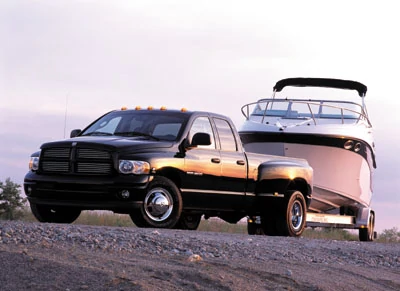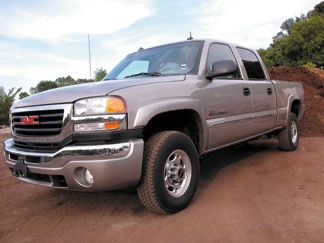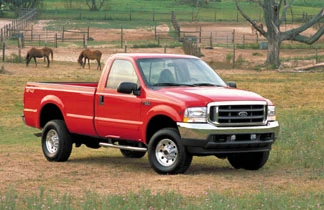In the past these trucks were for the select few specialty drivers that needed monster torque, improved fuel economy and miles of longevity. The first trucks were loud, dirty, painfully slow off the line and not much fun to drive.
Today more than 60 percent of all 3/4-ton trucks made in the United States are delivered with diesel motors. Unlike Europeans that demand diesel engines in light trucks and cars, Americans prefer diesels in their heavy-duty, full-size trucks.
So the Big Three are now in a race to put you into a diesel over a loaded 3/4-ton pickup at a $5,000 to $7,000 premium (including package transmissions). That’s some serious scratch.
So the heavy-duty question is, do you need a diesel truck? Let’s take a look at some of the things you’ll need to consider if one of these torque monsters is in your future.
Burning
If you don’t already own a diesel, you’re probably assuming that fuel prices for these bruisers are much less than the gas you’re buying now … well, probably not.
Several decades ago diesel fuel was significantly lower than regular, but no more. Presently, diesels enjoy a slightly lower price than regular, but only in warmer seasons. With greater fuel taxes, refinements for air pollution and additives for winter conditions, diesel fuel is sometimes more than the price of regular gas.
Getting the stuff can be a problem if you live in an urban or extremely rural environment. I live in a large midwestern city but few diesel gas pumps are close to my home. Of course, I never noticed until I started to drive diesel trucks. It’s not a huge inconvenience, but I have found myself running on fumes when a green-handled pump wasn’t where I assumed one would be.
As for fuel economy, it is impressive. I have tested new Dodge and Ford 4-by-4′s that have hovered around 17 miles per gallon on the highway while cruising a little over the speed limit. The fuel champ on my cross-country drives has been the Chevy Duramax delivering 21 miles to the gallon. To be fair, the tests on the Ford and Dodge were done in their first 5,000 miles. Fuel economy on these motors should slightly improve after break-in.
Maintenance and Longevity
Here is another surprise that many new diesel owners are in for; maintenance is expensive. Initially there is less maintenance than a gas engine, but routine check-ups are costly and prices for parts are often steep when they break. In the second half of the engine’s life cycle, the costs can really accelerate, making some buyers sell their trucks at the 120,000-mile mark.
As for miles on the road, ask a noncommercial diesel owner how long they think their engines will last, and the most common answer is, “Man, she’ll go a half million, I’m sure of it.” Well … maybe. All of these drivetrains are warranted for 100,000 miles and yes, large pro tractor-trailer engines do pass 500,000 and then some. Noncommercial drivers rarely surpass 30,000 miles per year. Depending on use and maintenance, many mechanics say that 200- to 300,000 is a more realistic expectation for these drivetrains.
So think about how many miles you drive and how long you keep your vehicles. If you’re turning over vehicles every three to four years, think again before purchasing a diesel. Resale values on diesels are higher than gas trucks, but if you’re a low-mileage driver, you need to do your homework before you step on the showroom floor.
The Big Pull
If there’s one thing that a diesel does perfectly, it’s pulling. Mammoth amounts of torque are your friend, when your choice of cargo is a load of lumber, horses, a big boat or a travel trailer that’s big enough for a family to live in. You need torque to comfortably pull these loads and you will find your fuel economy will hover at around 10 or 11 miles per gallon, depending on the load. That’s huge compared to big-block gas engines that can drop down as low as 6 or 7 miles to the gallon in similar driving conditions.
The Questions
Keep in mind a new half-ton Chevy Silverado with a 5.3-liter engine gets around 16 miles to the gallon on the highway. It can tow more than 8,000 pounds and will, with regular maintenance, last 150,000-plus miles.
Now ask yourself, do you tow every week? Are you regularly hauling loads in the 60-percentile of your current truck capacity? Do you drive more than 40,000 miles a year? Are you going to keep a truck more than four years?
Although a large-scale home renovation may put some strain on your half-ton during its two trips per year spent hauling a load of sheet rock, it may not justify buying a diesel. But if you throw a horse or travel trailer into your future, a diesel engine may be a good investment.
Before You Buy…
Talk to a local independent diesel mechanic before you but any new diesel truck. They will give you an honest picture of maintenance frequency, costs and mileage expectations. Factory dealers offer great service, but their maintenance staffs may be unwilling to discuss engine history and costs with potential buyers.
Breathe Easier
One of the quickest ways to give your diesel a boost is with an aftermarket exhaust. MBRP has a beautiful, stainless-steel, 4-inch dual exhaust that will give your diesel’s engine a surprising lift of horsepower and fuel economy. The package has everything you need and comes with a chrome tip — a sweet exhaust with a lifetime warranty for about $950.00. You can reach them at 1-800-636-7223 or www.mbrp.com.






